HIMSS convenes its annual conference this week in Orlando, kicking off with an Executive Summit that featured John Mackey, the CEO and Co-Founder of Whole Foods, in conversation with Cris Ross, CIO of the Mayo Clinic.
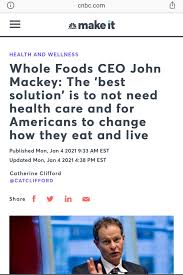 Mackey said in support of his long-held belief that food is the”best solution” to address Americans’ health.
Mackey said in support of his long-held belief that food is the”best solution” to address Americans’ health.
As for health care?
Not so much, at least as it’s delivered in the United States.
”Why don’t we have clinics that help people change their diets and lifestyles so that they can reverse the disease or prevent it?” Mackey asked, rhetorically.
”It’s astounding. There’s a huge entrepreneurial opportunity out there for this. And I’m going to do something about it. It’s going to be my next career after Whole Foods,” Mackey said, suggesting he might be that entrepreneur taking on the food-as-medicine business opportunity once he retires from his 44-year career with Whole Foods in September later this year.
“The healthcare system is failing in its purpose,” Mackey asserted.
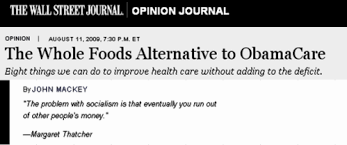 Health Populi’s Hot Points: John Mackey has held this view on food for a long time. In 2009, Mackey wrote an op-ed in the Wall Street Journal critiquing the Affordable Care Act, noting that,
Health Populi’s Hot Points: John Mackey has held this view on food for a long time. In 2009, Mackey wrote an op-ed in the Wall Street Journal critiquing the Affordable Care Act, noting that,
“While we clearly need health-care reform, the last thing our country needs is a massive new health-care entitlement that will create hundreds of billions of dollars of new unfunded deficits and move us much closer to a government takeover of our health-care system.”
He chose to introduce that WSJ column with a quote from Prime Minister Margaret Thatcher, who was quoted as saying:
“The problem with socialism is that eventually you run out of other people’s money.”
Four years later in 2013, promoting his (then) new book Conscious Capitalism, Mackey did an interview with NPR, morphing the word “socialism” to “fascism” when speaking about the Affordable Care Act.
Mackey told NPR in this interview that,
“In fascism, the government doesn’t own the means of production, but they do control it. And that’s what’s happening with these reforms.”
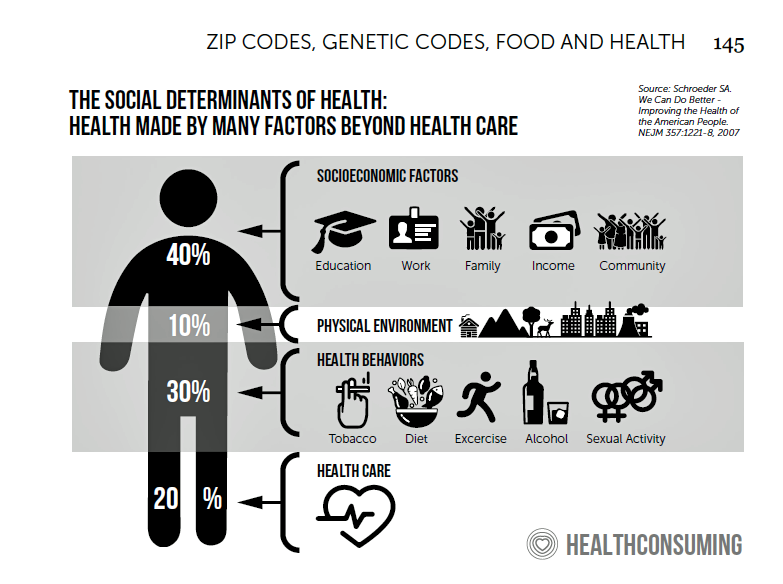 Now, nearly a decade later, the public health community’s notion of social determinants of health — more appropriately and simply put, the determinants of health — embrace both food and medical services (as well as safe housing, clean air and water, and education) all contributing to peoples’ well-being and health outcomes.
Now, nearly a decade later, the public health community’s notion of social determinants of health — more appropriately and simply put, the determinants of health — embrace both food and medical services (as well as safe housing, clean air and water, and education) all contributing to peoples’ well-being and health outcomes.
It’s more of an “and” than an “or,” we know now in the wake of the COVID-19 pandemic, as financial health connects with mental health, physical health, and social/civic health. Yes, to healthy food. Yes, to health care access (especially primary care). Yes, to clean and safe environments. Yes, to equity and mutual respect for our fellow health citizens.
Remember that Amazon will continue to own Whole Foods, which the ecommerce force acquired in 2017, long after Mackey leaves the company.
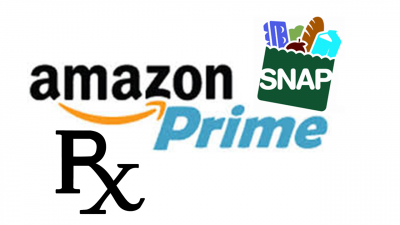 Amazon has already built many tracks in health care, from telehealth to pharmacy, medical supply ecommerce platforms and company health clinics. Furthermore, I’ve been a fan of Amazon’s extending Prime to enrollees in SNAP benefits that help people needing access to food security and nutritious foods to order via Prime convenient and accessible consumer experiences.
Amazon has already built many tracks in health care, from telehealth to pharmacy, medical supply ecommerce platforms and company health clinics. Furthermore, I’ve been a fan of Amazon’s extending Prime to enrollees in SNAP benefits that help people needing access to food security and nutritious foods to order via Prime convenient and accessible consumer experiences.
In fact, the health care industry ecosystem-wide is catching up with Mackey‘s vision of food and nutrition embedded into health care. It’s not nearly universal, but as value-based payment grows, year on year, business models are incorporating food-as-medicine and nutrition protocols in the ways providers taking risk are using telehealth, remote health monitoring, and “prescriptions” for broadband — all to bolster health outcomes and peoples’ ability to self-care at home.
For other takes on Mackey’s HIMSS keynote, check out…


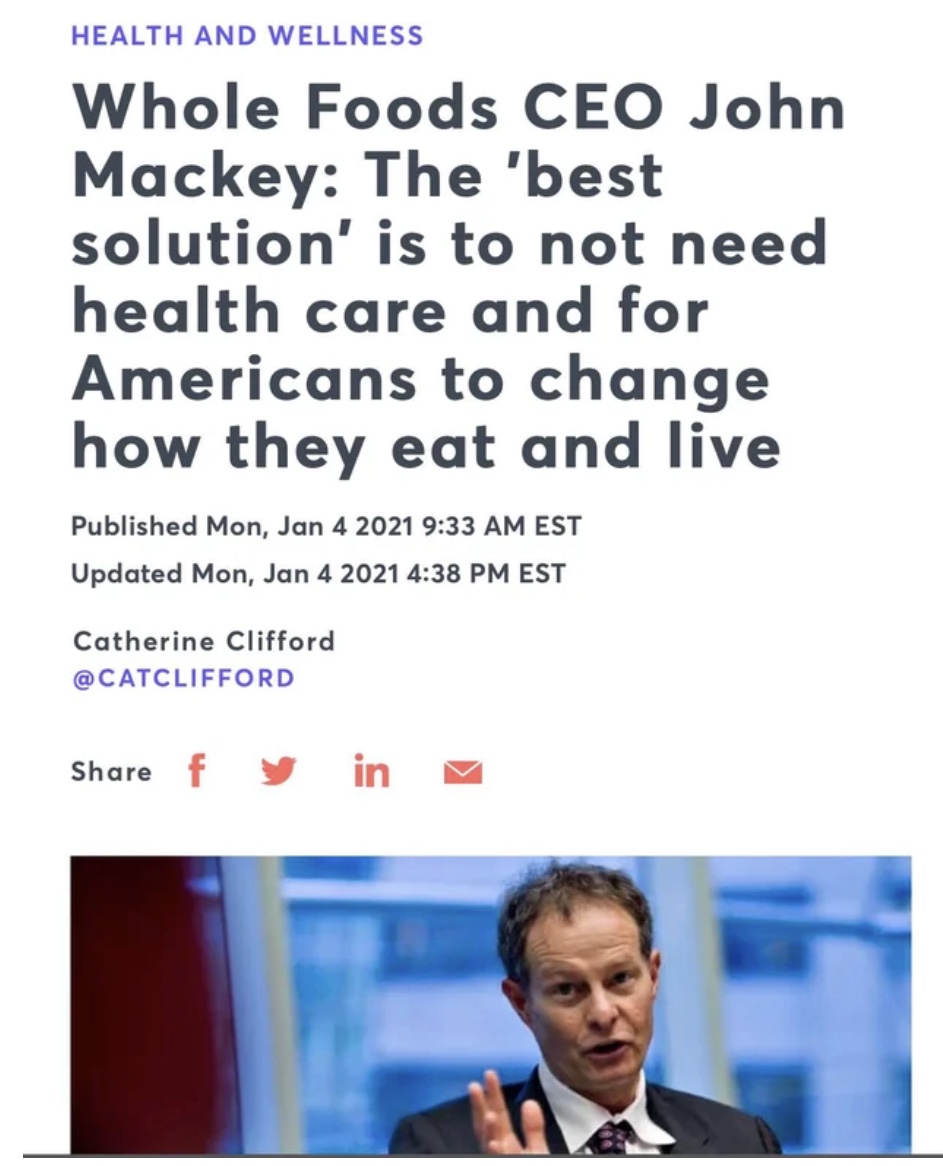


 Interviewed live on BNN Bloomberg (Canada) on the market for GLP-1 drugs for weight loss and their impact on both the health care system and consumer goods and services -- notably, food, nutrition, retail health, gyms, and other sectors.
Interviewed live on BNN Bloomberg (Canada) on the market for GLP-1 drugs for weight loss and their impact on both the health care system and consumer goods and services -- notably, food, nutrition, retail health, gyms, and other sectors. Thank you, Feedspot, for
Thank you, Feedspot, for  As you may know, I have been splitting work- and living-time between the U.S. and the E.U., most recently living in and working from Brussels. In the month of September 2024, I'll be splitting time between London and other parts of the U.K., and Italy where I'll be working with clients on consumer health, self-care and home care focused on food-as-medicine, digital health, business and scenario planning for the future...
As you may know, I have been splitting work- and living-time between the U.S. and the E.U., most recently living in and working from Brussels. In the month of September 2024, I'll be splitting time between London and other parts of the U.K., and Italy where I'll be working with clients on consumer health, self-care and home care focused on food-as-medicine, digital health, business and scenario planning for the future...